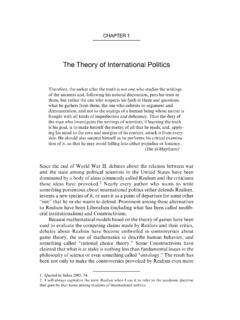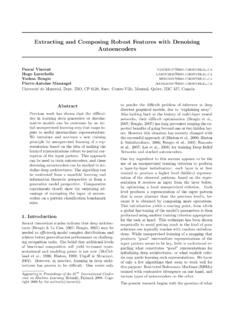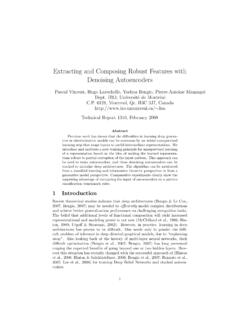Transcription of TOK: Knowledge Questions - Benito Juarez IB DP Hub
1 TOK: Knowledge Questions In TOK there are two types of Knowledge claims: Claims that are made within particular areas of Knowledge or by individual knowers about the world. It is the job of TOK to examine the basis for these first-order claims. Claims that are made about Knowledge . These are the second-order claims made in TOK that are justified using the tools of TOK, which usually involve an examination of the nature of Knowledge . Knowledge Questions are Questions meant to examine and engage with Knowledge Claims associated with real life situations. For the Prescribed Title and the Presentation, you must construct and engage with Knowledge Question.
2 In formulating your own Knowledge Question, you might consider phrasing the question in terms of Theory of Knowledge concepts and vocabulary (words in bold). Beginning the question, How can we know? or putting the word Knowledge in the question. For example, Is our Knowledge in maths actually more certain than our Knowledge in science? More imaginative ways might include, How far is it or Is the evidence for x and on what reasonable grounds? Or, Which interpretation is more or y , or, Is the assumption that x well founded? Examples of TOK vocabulary include: Knowledge , justification, interpretation, judgment, evidence, theory, explanation, coherence, assumptions, implications, reason, emotion, sense perception, language and paradigm.
3 An unsuitable choice for a presentation Knowledge Questions would be, Should there be freedom of speech? This is too general and not focused enough on TOK. You need to focus on Knowledge . A better Knowledge Question might be more precise and couched in TOK vocab. For example, What part might reason, emotion and language play in our interpretation of historical and contemporary events? Example: Future population growth in Africa Not a Knowledge question: How can we predict future population growth in Africa? This is not a Knowledge question because it is a technical question within the discipline of population studies .
4 Good Knowledge question: How can a mathematical model give us Knowledge even if it does not yield accurate predictions? This is now sufficiently general and explores the purpose and nature of mathematical modeling. Example: The placebo effect and its impact on the medical profession Not a Knowledge question: How does the placebo effect work? An answer to this might involve a technical explanation in psychology rather than engaging Knowledge creation. A good Knowledge question: How could we establish that X is an active ingredient in causing Y? This question is actually a rather general one about how we can know about causal links.
5 It is a classic Knowledge question. Consider these alternative Questions : 1. Can we trust the senses? 2. When can we trust the senses? 3. Should we trust the senses? 4. To what extent should we trust the senses? All four Questions are forms of Knowledge Questions , but they are varied in their impact and the quality of enquiry they generate. Knowledge Questions of the first type are fairly weak or low level . Notice how they start with the verb can . Questions which start with variations of this verb ( is , do , will , have and so on) are closed Questions , to which you can usually answer yes or no without much further informed discussion.
6 Knowledge Questions of the second type are sound, but may end up in a more factual discussion of the topic instead of one that Questions how Knowledge is built. Notice how it starts with one of the 5 Ws, when . Knowledge Questions of the third type are slightly stronger and more open in their impact: the verb should already introduces an ethical element to our thinking and encourages us to weigh up the strengths and weaknesses of our topic. Alternative starting expressions could be might , could , or would either alone or in conjunction with one of the 5Ws. Knowledge Questions of the fourth type are perhaps the strongest.
7 Look at the command expression To what which challenges the reader us not only to explore the scale and depth of Knowledge , but also to evaluate the methods of its construction. Other command expressions are In what (which allows the reader to compare and contrast how Knowledge is built in different AOKs) and How (which allows the reader to enquire into issues related to the limits of Knowledge and its implications). Examples of Knowledge Questions by AOK, WOK, and General History Are historical claims restricted by the language they use? Is all history biased? How important is the role of statistics in history?
8 Does history show we have made ethical progress? To what extent does emotion play a role in historical interpretation? Is historical objectively possible? To what extent does historical Knowledge change over time? How is Knowledge about the past different from other kinds of Knowledge ? How does the language used to describe the past change how history is understood? Natural science (Key words: scientific method, Popper's principle of falsification, scientific revolution and paradigm shift) Is language necessary for the construction of Knowledge in the natural sciences? Do scientists have ethical responsibilities?
9 How certain is scientific Knowledge ? If all scientific experiments have 'uncertainty' how can we know 'truth' in science? How certain is the theory of evolution? How is Knowledge in literature similar to Knowledge in natural science? To what extent does Knowledge in science change? Is previous Knowledge more important than creativity in science? How do we know when scientific conclusions are justified? Does science allow for intuition? Human science (Key words: determinism, free will, Hawthorne effect, nature vs. nurture) Is it true to say that the human sciences are less certain than the natural sciences?
10 What determines whether a theory in the human sciences is convincing? How reliable are statistics in economics and business decisions? To what extent should business decisions be based on ethical considerations? Which is more important in advertising: reason, emotion, language or perception? How true are economic models? The law of supply and demand relies on the assumption of 'ceteris paribus'. Top what extent does this exist in real life? Can one model ever represent an entire economy accurately? How reliable are geographic models? What are the limits of statistics in the human sciences? Maths (Key words: axiomatic system, mathematical logic, a priori reasonings, rules of inference [applied to axioms], proof) Does maths need language to be understood?







